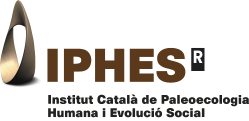NewsNext Previous
Members of IPHES teach to undergraduate students in the History and Arts History degree at URV
In some of the curses, doctoral students contribute significantly
During the 2016-17 academic year, members of the Institut Català de Paleoecologia Humana i Evolució Social (IPHES), teach a total of four subjects in the frame of the History and Arts History undergraduate degrees of the Universitat Rovira i Virgili de Tarragona (URV), three of which are mandatory. These are: Human evolution and Culture, and Historic Methodology, by Robert Sala, and Prehistory, by Ethel Allué and Eudald Carbonell. In some of these subjects, doctoral students, Anna Rufà, Esther López, Leopoldo Pérez and Pedro Piñero contribute significantly.
The optional course is Prehistory of the Iberian Peninsula and is taught by Isabel Cáceres and Anna Rufà. Furthermore, the archaeologist Eudald Carbonell makes a number of sessions dedicated to specific items like violence, diet and technology.
 The technology practice by Eudald Carbonell was, focused in a prospection nearby IPHES
The technology practice by Eudald Carbonell was, focused in a prospection nearby IPHES
In the framework of the Prehistory and Prehistory of the Iberian Peninsula courses recently took place a practical training at IPHES. Like in previous times, in that academic year were offered three workshops: one about zooarchaeology carried outtrained by Isabel Cáceres, the second about microvertebrates, taught by Pedro Piñero, and the last one, on archeobotany, by Ethel Allué.
The technology practice by Eudald Carbonell took also place and was focused, this year, in a prospection nearby IPHES where materials are found in the surface of the so called Tarragona pre-urban zone.
Also, the students visit IPHES guided by Marta Fontanals, member of the Unit of Projects and Transference (UPT). The aim of this practical course is to give an approach to the third year students of History and Arts History degree to the activities made by the members of IPHES. During the workshop, there is a special remark on the different lines of research through the variety of scientific ways such as laboratories, the use of microscopes and fieldwork.


